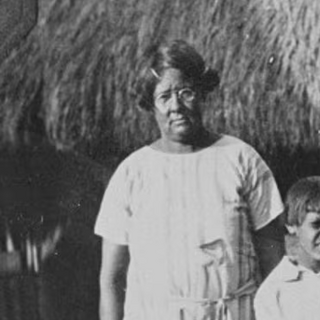Related Research Articles
John Kinsella is an Australian poet, novelist, critic, essayist and editor. His writing is strongly influenced by landscape, and he espouses an 'international regionalism' in his approach to place. He has also frequently worked in collaboration with other writers, artists and musicians.

Tommy Windich was an Indigenous Australian member of a number of exploring expeditions in Western Australia in the 1860s and 1870s.

Leslie Allan Murray was an Australian poet, anthologist and critic. His career spanned over 40 years and he published nearly 30 volumes of poetry as well as two verse novels and collections of his prose writings.
Robert Clyde Packer, usually known as Clyde Packer, was the son of Australian newspaper magnate Frank Packer and the elder brother of media baron Kerry Packer. From 23 April 1964 to 22 April 1976 he was a Member of the New South Wales Legislative Council for the Liberal Party. Packer was originally intended to be his father's heir before a falling-out in 1972 resulted in Kerry inheriting the family business in 1974 upon Frank's death.

Woodman Point is a headland on the west coast of Western Australia. It is located in the Perth suburb of Coogee, 22 km (14 mi) south-south-west of the city centre and 8 km (5.0 mi) south of Fremantle. It extends westward into the Indian Ocean. The coastal waters immediately to the north of the point are known as Owen Anchorage, while to the south is Jervoise Bay. Woodman Point marks the northern extent of Cockburn Sound.

Forrest Gander is an American poet, translator, essayist, and novelist. The A.K. Seaver Professor Emeritus of Literary Arts & Comparative Literature at Brown University, Gander won the Pulitzer Prize for Poetry in 2019 for Be With and is chancellor of the Academy of American Poets and a member of the American Academy of Arts and Sciences.
Kate Lilley is a contemporary Australian poet and academic.
Sarah Day is an English-born Australian poet and teacher. She was also the poetry editor of Island Magazine for several years.
The Forrest River massacre, or Oombulgurri massacre of June 1926, was a massacre of Indigenous Australian people by a group of law enforcement personnel and civilians in the wake of the killing of a pastoralist in the Kimberley region of Western Australia.
Michael Patrick Byrne is an Australian poet, reviewer, anthologist and freelance poetry tutor. He was born in Sydney, spent his early childhood in Tuross Head on the New South Wales South Coast, and came to Canberra in 1987, where he currently lives. Byrne attended high school at Radford College in Canberra, graduating in 1996. In 1998 he undertook an Arts degree from the Australian National University, completing it in 2001. In 2003 he began a Masters in Journalism from the University of Wollongong, completing it in 2004. In 2007, he worked for The Word Magazine for two months as a journalist, salesman and researcher. In March 2008, he had two poems published in Quadrant. In March 2011, he had another poem published in Quadrant.
Peter John Rose is an Australian poet, memoirist, critic, novelist and editor. For many years he was an academic publisher. Since 2001 he has been editor of Australian Book Review.
Dan Guenther, is an American novelist and poet. A graduate of Coe College, he has a Master of Fine Arts from the Iowa Writers' Workshop. He was a captain in the U.S. Marine Corps. His poems and letters from Vietnam, during the Vietnam War, were included in the acclaimed novel, The Stones of Summer by Dow Mossman, published by Bobbs-Merrill in 1972 and republished by Barnes & Noble in 2003. In 2002, Guenther appeared in the documentary film Stone Reader by Mark Moskowitz. The film chronicled the director's attempt to revive and have republished the acclaimed book of seemingly vanished author Dow Mossman, a lifelong friend of Dan Guenther. The revival was successful.
Gary Catalano was an Australian poet and art critic.
William "Wim" Boissevain was an Australian painter.

The Forrest River massacre, or Oombulgurri massacre, was a massacre of Indigenous Australian people by a law enforcement party in the wake of the killing of pastoralist Fred Hay, which took place in the Kimberley region of Western Australia in 1926. The massacre was investigated by the Woods Royal Commission in 1927 which subsequently determined that 11 people had been killed. Charges were brought against two officers but dismissed for lack of evidence. The Commissions findings have been disputed by journalist Rod Moran, whose analysis has received some academic support while most academic historians accept that a massacre did take place but disagree over the number of victims.
Ernest Richard Bulmer Gribble was an Australian missionary. Though considered to be temperamentally unsuited to his vocation, he became a strong advocate for better treatment of Australian Aboriginal people, saving whose 'remnants' he considered part of his mission.
Gwen Kelly was an award-winning Australian novelist, short story writer and poet, whose fourth novel, Always Afternoon, was made into a television mini-series in 1988. She was considered by some to be one of the "major Australian writers", whose novels are "an intimate chronicling of women's lives and of our yesterdays", "probing stereotypical Australian attitudes and behaviour".

James Noble (1876?-1941) was a missionary and the first Aboriginal clergyman in the Anglican Church of Australia. He was also a significant source of evidence in investigations into what became called the Forrest River Massacre.

Mary Finnin was an Australian artist, art teacher and poet.

Angelina Noble was an Australian linguist and missionary. She and her husband founded churches and missions in Australia.